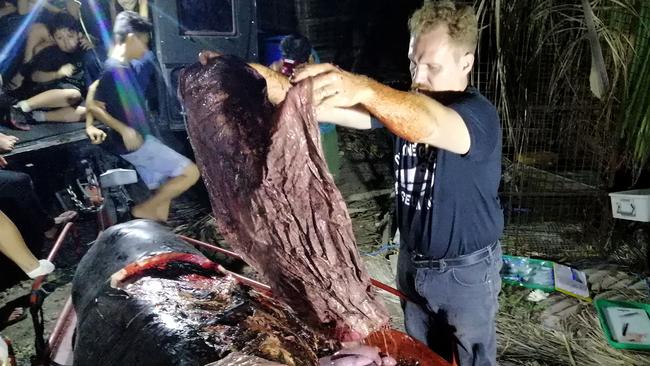Whale dies after eating 40kg of plastic
The whale consumed one of the largest amounts of plastic — hundreds of items — ever removed from a marine animal’s stomach.

A whale was found to have died after consuming 40 kilograms of plastic, one of the largest amounts removed from the stomach of a marine mammal.
The Cuvier’s beaked whale, found in the Philippines, had swallowed hundreds of items, including shopping bags and rice sacks.
Darrell Blatchley, a marine biologist who examined the whale, said that it had died of starvation and dehydration through consuming plastic.
Whales are unable to digest food when their guts become blocked with plastic and they may also feel full and stop feeding. They become dehydrated because they get much of the water they need from breaking down food.
Brendan Godley, professor of conservation science at the University of Exeter, said that deep-diving beaked whales were particularly prone to ingesting plastic items such as bags because they resembled the squid on which they feed.
He said that whales already in poor health were more likely to make the mistake.
Mr Blatchley was called to recover the 4.7m whale, which had been seen vomiting blood after becoming trapped in the shores of the Mabini Compostela valley. It had died by the time he arrived.
Images posted online showed the whale’s corpse being towed to shore and sheets of plastic being lifted out of its stomach.
Marine biologists at the D’Bone Collector Museum in Davao City have recovered 61 whales and dolphins in the past ten years but said that their latest discovery was “the most plastic we have ever seen in a whale”.
Mr Blatchley said: “Upon reaching the stomach I knew this whale had died due to plastic ingestion.
“I was not prepared for the amount of plastic. Forty kilos roughly of rice sacks, grocery bags, banana plantation bags and general plastic bags. Sixteen rice sacks total. It was so bad the plastic was beginning calcification.”
Many dead whales have been found to have plastic in their stomachs but even the worst cases involved only a few kilograms. A Cuvier’s beaked whale that became stranded on the Isle of Skye in 2015 was found to have 4kg of bin liners, zip-lock and freezer bags in its stomach.
Mr Blatchley called on the Philippine government to take action against people dumping plastic into the sea.
“The Philippine people are a proud people; sadly it’s not in being clean or taking care of the environment,” he said. “The Philippines needs to change from the children up or nothing will be left.”
He said that his team would continue to sift through the whale’s guts to identify the plastic that had clogged its stomach.
“Doing this is not just for our gain but mainly to give education and for people to realise how magnificent these animals are,” he added.
The Philippines has one of the worst records for dumping plastic in the ocean. More than half the eight million tonnes of plastic that enter the sea each year comes from five rapidly growing economies — China, Indonesia, the Philippines, Thailand and Vietnam — according to the Ocean Conservancy and the McKinsey Center for Business and Environment. They said in a report published in 2015 that measures to tackle the problem had to be taken at a global level and would cost about pounds 4.2 billion a year.
A sperm whale whose carcass washed up on an Indonesian beach in November had nearly 6kg of plastic waste in its stomach, including 115 drinking cups, four plastic bottles, 25 plastic bags and two flip-flops. Last June 80 plastic bags and other items weighing a total of 8kg were found in a pilot whale’s stomach in Thailand.
The Times


